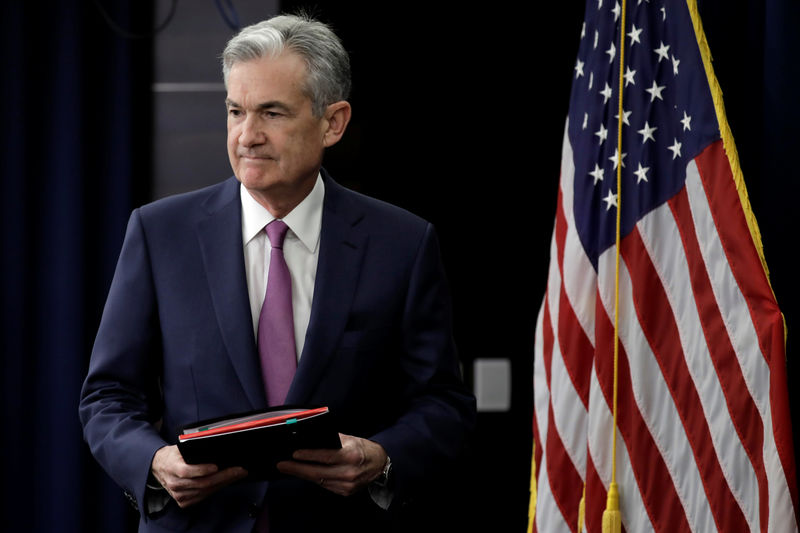By Geoffrey Smith
Investing.com -- Jerome Powell has won an important ally in his campaign to be reappointed to the chairmanship of the Federal Reserve for a second term. Joe Biden faces trouble as he tries to bring some order to the chaotic withdrawal from Afghanistan. Gig economy stocks are suffering after a California court struck down their exemption from treating independent contractors the same as staff, and the European economy cooled off a big in August. Oil meanwhile is rebounding after China said it had no community transmission of Covid-19 for the first time since July. Here's what you need to know in financial markets on Monday, 23rd August.
1. Yellen reportedly backs Powell for a 2nd term
Jerome Powell’s chances of being appointed for a second term as chairman of the Federal Reserve appear to have risen sharply.
A report by Bloomberg at the weekend said that Treasury Secretary Janet Yellen – herself a veteran of the central bank – had told White House advisers that she supports a second term for Powell, who has been a valuable ally in calming fears of inflation as the new administration has laid out its vast spending plans.
The leak could give Powell greater confidence to signal the start of the phasing out of bond purchases at the Fed’s Jackson Hole symposium later this week.
However, comments on Friday from Dallas Fed chief Robert Kaplan, who said the Fed needs to stay flexible on stimulus as long as the pandemic risks getting out of hand again, have slightly lowered the odds of an immediate start to tapering, analysts said.
2. Biden drafts airlines, as allies press for extended deadline for Afghan evacuation
The Taliban reportedly refused suggestions that the deadline for the withdrawal of U.S. forces and their support staff from Afghanistan could be extended.
U.S. President Joe Biden has come under heavy pressure to do more following the chaotic scenes that accompanied the collapse of the Afghan government and the return of the Islamic militants to power last week. Over the weekend, he drafted 18 planes from six civilian airlines to help ferry civilians to safety.
U.K. Prime Minister Boris Johnson - also a target for much criticism over the last week - will ask Biden to extend the deadline at a G7 summit on Tuesday, in order to evacuate as many Afghans as possible who face retribution from the Taliban after working to support western forces there during the last 20 years. Taliban spokespeople told Reuters on Monday they had so far not received any formal request for an extension.
3. Stocks set to open higher but gig economy champions suffer
U.S. stock markets are set to open higher later, with a measure of risk appetite returning around the world after China reported no new cases of Covid-19 through community spread for the first time since July.
By 6:15 AM ET (1015 GMT), Dow Jones futures were up 145 points, or 0.4%, while S&P 500 futures and Nasdaq 100 futures were both up 0.3%.
Stocks likely to be in focus later include gig economy specialists such as Uber (NYSE:UBER), Lyft (NASDAQ:LYFT) and DoorDash, after California’s Supreme Court on Friday ruled that the measure exempting them from a requirement to treat drivers as employees is unconstitutional.
4. European economy cools a bit; Bundesbank warns
The Eurozone economy weakened more than expected but continued to expand at a rapid pace in August, judging by purchasing manager indices released by IHS Markit.
The preliminary Eurozone PMI fell to 59.5 from an all-time high of 60.2 in August, with the latest wave of Covid-19 not yet enough to influence business or consumer activity. In the U.K., the composite PMI fell more sharply to 55.3 from 59.2, but this did little more than iron out an anomaly with official data that have consistently shown a weaker growth dynamic.
In both reports, suppliers’ lead times lengthened sharply, suggesting that the supply chain disruptions caused by the pandemic are still far from easing up. The U.K. Confederation of British Industry warned that factory inventories were at their lowest level ever.
Elsewhere, the German Bundesbank's monthly report warned that growth in Europe's largest economy may fall short of forecasts due to the spread of the Covid-19 delta variant, while also noting that the pass-through of inflationary pressures had been greater than initially expected.
5. Oil rebounds on better China news
Crude oil prices rebounded smartly after losing some 8% last week on concerns about Covid-19 and its impact on the supply-demand balance. The outlook brightened over the weekend after China said it had had no community transmission of Covid-19 for the first time since last month.
By 6:15 AM ET (1015 GMT), U.S. crude futures were up 2.9% at $63.91 a barrel, while Brent was up 3.0% at $66.98 a barrel.
That follows a report on Friday that net speculative positions in crude futures had fallen to their lowest in nine months last week.
Over the weekend, Israel’s Prime Minister Naftali Bennet said he will press Joe Biden at a meeting on Thursday to scrap plans for talks on the lifting of sanctions against Iran for its resumption of high-grade uranium refining, which brings it ever closer to being able to make nuclear weapons.
